View our Product Catalog to find products you can try for free.
Choosing Resilience
Triathlete Scott Lang keeps doing what he loves and refuses to let cancer sideline him.
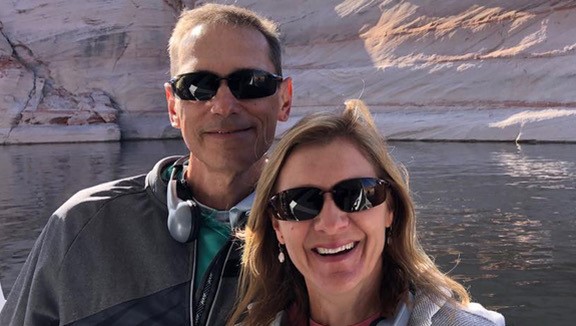
Read about how a 55-year old husband and father found his new normal after a stage 4 cancer diagnosis and ileostomy surgery.
Every time Scott Lang crosses a finish line, he has the satisfaction of knowing that he has outrun, outbiked or outswum cancer once again. Spectators would never guess that he is undergoing three hard-hitting rounds of chemotherapy every two weeks to stave off a rare cancer that has no cure.
“I wasn’t going to stop what I was doing,” explains Scott. “I was determined not to let cancer change that.”
Receiving a shocking diagnosis
His relationship with the disease began in 2017. While training for the RyanMan 70.3 mile Triathlon in Mississippi, Scott suffered severe abdominal pains. Scans showed a blockage in his small intestine, and he was admitted to the hospital for minor surgery to remove it. During the surgery, however, the doctors found stage 4 cancer throughout his abdomen, and due to the blockage, they opted to create an ileostomy.
As if this wasn’t shocking enough, Scott and his family were later told that he has appendiceal cancer, described as a cup of rice sprinkled throughout his abdomen. Surgery was not an option, and Scott started typical colon cancer treatment to keep the disease from spreading. When his doctor told him that he had two years to live, Scott refused to let it stop him in his tracks.
“I smiled and told him that I was going to ‘skew’ the numbers because I had a lot of life to live yet.”
Finding a new normal
Since, coincidentally, his wife is an oncology nurse, Scott knew that new cancer treatments were being tested every day. Hopeful that one would be found for his disease, he kept doing what he loves. Once the stitches around his stoma were removed, Scott started running again, knowing he had to find “a new normal” if he was going to continue pursuing his passion.
That December, he completed the Mississippi Gulf Coast Marathon with his sons, even though the going was slow due to frequent stops to empty his pouch. Throughout 2018, while undergoing chemotherapy, he completed four half marathons, 15Ks, 10Ks, 5Ks, several sprint triathlons, and an Olympic distance triathlon, all while training for the Deep South Triathlon scheduled for October.
“I was never competitive, but now I’m competitive with myself,” explains Scott. “I keep trying to beat my run and swim time—I just want to improve.”
Overcoming new obstacles
Scott’s biggest problem as a triathlete with an ostomy was a leaky pouch. After much trial and error, he discovered that using additional ostomy accessories did the trick. And he always carries a spare kit of ostomy supplies, even though most of the time he can make it through the smaller triathlons without a pouch change.
Scott’s cancer experience is not all rosy, and treatment does take its toll. Every other Tuesday, once they have infused all of his chemotherapies, he wears a portable infusion pump for 48 hours. He feels lethargic and has neuropathy in his feet and hands. And some days he just wants to sleep. But once he begins to run, pedal, and swim he feels better.
Getting support
Scott’s support team of family and friends is strong, and helps motivate him with weekly FitBit and Strava competitions. His hard work paid off and he completed the 2018 Deep South Triathlon at his personal best.
“There were long transitions due to adjustments for my ostomy, but no leaks!” says Scott. “I felt so good crossing that finish line – I was so happy just to be participating.”
Scott completed all of the same events in 2019 as he did in 2018, leaving appendiceal cancer in the dust. What keeps him going? Apart from the sense of accomplishment he experiences, Scott loves the camaraderie of his fellow participants, volunteers, and even the police officers who cheer him on along the route. He is grateful for them all.
Choosing to be resilient
As far as advice to others who are adjusting to a colostomy, ileostomy, or urostomy, Scott feels that it’s important to choose to go on with life no matter the prognosis.
“You have to find your new normal after ostomy surgery,” concludes Scott. “Sure it’s hard, but keep trying different options and don’t give up what you love, whether it’s running, tennis, or any other activity.”
Scott Lang is a retired Coker Area Field Trainer at the Chevron Refinery in Pascagoula, Mississippi. When he’s not pursuing his passion for triathlons, he and his wife Mary enjoy traveling the world. They are blessed with three grown sons.
Financial Disclosure: Scott received compensation from Hollister Incorporated for his contribution to this article.
Scott passed away on February 26, 2020, leaving behind a legacy of hope and resilience. We are truly thankful for his willingness to share his story with us to empower our readers to keep going that extra mile no matter the circumstances.
- 1 Shares
- 11 Recommended






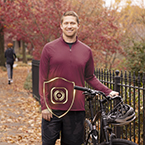

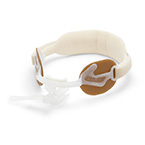



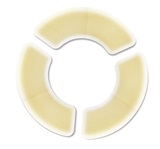
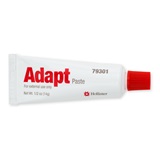
 Call Us
Call Us  Email Us
Email Us  Join Us!
Join Us!  Sign Up
Sign Up 